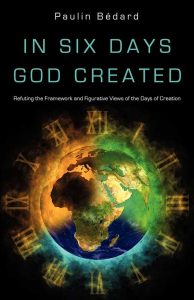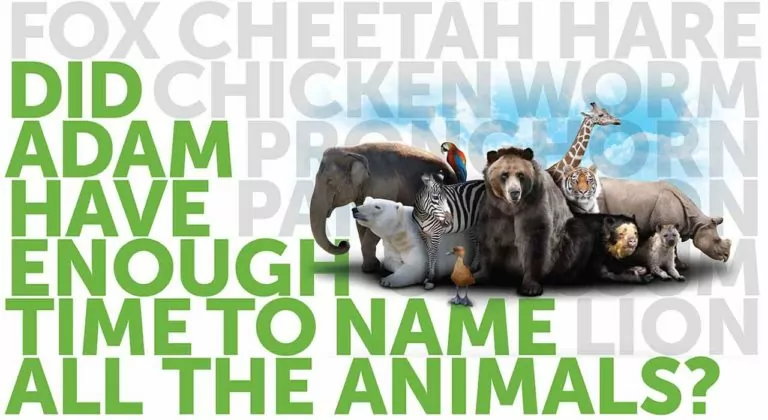Some people argue that the activities assigned to Adam on the sixth day, described in Genesis 1:26-28 and Genesis 2:19-20, were too many for him to have been completed in a single 24-hour day. The activity of naming all the animals, in particular, would have needed much more time.
And if he couldn’t have done it in 24 hours, then this would contradict the literal interpretation of the six days of creation, forcing us to opt for a non-literal interpretation of these days.
Let us examine this argument more closely to see if it is valid.
Adam finished the task
In Genesis 2:19-20 we read:
“Now out of the ground the Lord God had formed every beast of the field and every bird of the heavens and brought them to the man to see what he would call them. And whatever the man called every living creature, that was its name. The man gave names to all livestock and to the birds of the heavens and to every beast of the field. But for Adam there was not found a helper fit for him.”
According to this text, Adam actually finishes naming the animals that God has shown him – he completes all this activity even before the creation of Eve.
We can see, then, that this wasn’t a task Adam was supposed to accomplish over the course of the rest of his life, or which he could have shared with his future wife, or which he could have passed on to future generations (as it was the case for the mandate to rule over the earth and over the animals). Adam indeed named all the animals that God has shown him before the end of the sixth day.
God presented the animals to Adam
So we can see that Adam had some tight time constraints. But we also read, concerning the animals that Adam had to name, that God “brought them to the man.”
This detail is not trivial. Adam did not need to go everywhere looking for these animals. The Lord brought them to him. We can well imagine that this would make greatly increase the speed at which Adam could name the animals, greatly reducing the duration of the naming process.
The species of animals named were limited
We should remember that Adam wasn’t called to name every animal. The animals named were “all livestock,” “every bird of the heavens,” and “every beast of the field.” The latter category may correspond to terrestrial mammals.
The text doesn’t say anything about Adam naming the fish of the sea, other marine organisms, insects, arachnids, reptiles or dinosaurs (distinguished from terrestrial animals in Genesis 1:24), which excludes a large number of species. For example, the arthropods – excluded from this list – are by far the phylum that counts the greatest number of species of the animal kingdom (80% of known species, more than one and a half million living species: trilobites, crustaceans, arachnids, insects, etc.). For this first exhibition of animal kind, God left aside the strangest “creeping and crawling” creatures and presented to Adam only the most useful (livestock) and beautiful (birds, mammals) specimens of His collection. Thus Adam named only a small fraction of all the animals created by God, which greatly reduced his work.
The sort of naming Adam was doing
On the sixth day, Adam was not doing taxonomy, in the sense that he did not need to describe the living organisms or to classify them in a specific system. All that God proposed to him was to name them. It was not necessary for Adam to give names that would be used as a basis for a rigorous classification.
Furthermore, it seems that God did not give any specific orders to Adam about this activity. The text simply says that God “brought them to the man to see what he would call them.” Adam did not have to give specific names to each animal neither was he requested to follow a rigorous method.
It is therefore possible that God presented to Adam successive groups of birds gathered according to what we call genus, family, or even order. Genesis says that Adam named all livestock, all the birds of heaven, and all the beasts of the field. However, this can be achieved in various ways. Today the class called “birds” lists almost 10,000 known species, distributed in 29 orders, including more than 200 families and 2,200 genera.[1] As for the class called “mammals” (including marine mammals), it includes more than 5,400 species, distributed in 29 orders, 153 families, and 1,229 genera.[2]
God may have presented to Adam a first group of birds that included every type of pheasants, partridges, cocks, quails, that Adam could have generally named chickens. Then God could have presented another group of birds including mergansers, scoters, mallards, teals, etc., that Adam could have all named ducks. It was legitimate for God to do so for practical reasons of simplicity and efficiency. Although less detailed than if he had named all the specimens to the species, this way of naming fully complies with the nature of the activity of naming according to the Bible.[3] There was no problem, therefore, to do all this work in less than half a day.
There were fewer species
We must also understand the phenomenon of speciation, which took place during the period of time between the creation of the first “kinds” of animals and today. Speciation is a rapid increase in the number of species due to the loss of genetic information in the genera originally created by God.
This is a phenomenon that goes in the opposite direction to the transformism taught by the neo-Darwinian theory of evolution. Evolution in the technical sense (and not the blurred meaning of “change”), involves a slow but significant increase in genetic information in order to achieve the tremendous transformation involved in the production of a man from the first tiny living cell (a phenomenon never observed by any modern scientist, admitted by Richard Dawkins). Speciation, in contrast, is a scientific phenomenon frequently observed, that some Christians mistakenly call “micro-evolution” (a very unhappy and confusing designation, since speciation has nothing to do with evolution, which goes in the opposite direction).

For example, the initial “canine” genus created by God on the sixth day could have contained in its genetic material all the genes capable of producing all the many breeds of dogs and wolves that we know today. In order to subsequently see the appearance of the many breeds of modern dogs, with the observable traits of each race (phenotype), the process of speciation had to happen. To have dogs with short legs only, it was necessary to remove from the line all individuals with long legs, thereby eliminating the genetic information “long legs” from this line. This loss of genetic information occurring in only a few generations has resulted in a rapid increase in the number of subspecies. In many cases, speciation is so marked that it is impossible for different lines coming from the same original “kind” to reproduce together.[4]
It is quite possible that in the beginning God created a couple of big cats, producing thereafter all extant species of cats (lions, leopards, tigers, etc.) through the rapid process of speciation.[5] The same applies to other kinds of mammals and birds.
In short, the species included in the “livestock,” the “birds of heavens” and the “field animals” that God presented to Adam were probably far fewer than today. Obviously, God gave Adam less work than he gave to modern taxonomists.[6]
Adam was smarter than us
Theistic evolutionists and progressive creationists often make the mistake of projecting the conditions of life as we know them today on the special and unique period during which God performed His creative works. Thus they think that Adam had similar capabilities to ours. But what do we know exactly about Adam’s intellectual capacity to claim that he was unable to perform the task of naming the animals in only one day?
It is extremely difficult for us to imagine a man who could have had much greater intellectual abilities than us. But the brain of Adam was undoubtedly greatly superior to those of Isaac Newton and Albert Einstein together, because man had not yet suffered the destructive effects of sin greatly affecting our present intellectual capacity. We must let Adam have the freedom to have been much smarter than us and to have been fully capable of naming in a single day all the animals that God has shown him, without even becoming tired.
Why would God made Adam languish?
Note that the activity of naming the animals is surrounded by the “problem” of Adam’s solitude. First, God noticed this loneliness and expressed His intention to create a companion for him. “The Lord God said, It is not good that the man should be alone; I will make him a helper fit for him” (2:18). Then God came to present the animals to Adam, to see what he would call them, which Adam did (2:19-20). Finally, Adam himself expressed his newly discovered emptiness, as a clear conclusion of his naming of the animals. “But for Adam there was not found a helper fit for him” (2:20).
From this text it seems clear that one of the main purposes for which God presented to Adam the animals was to awaken him to the reality of his solitude. As he watched all these animals that were passing before him, Adam must have realized that they were all male and female, while he had no “female” with him.
In sum, the development of a taxonomic system was not the sole purpose of the presentation of these animals (otherwise God would have asked Adam to also name all the fish of the seas and all the other small terrestrial creatures). This exercise was also intended to make Adam sigh and to prepare him to be grateful for the wonderful gift that God had already planned to give him.
So why would it have been necessary for God to impose upon Adam an activity requiring a long period of time? This would have suggested either the stupidity of Adam – who would have needed a lot of time before realizing he had no companion of the opposite sex with him – or the perverse pleasure of God in making Adam languish before finally giving him the companion after which he sighed.
Adam was not stupid and did not need a long time before realizing his loneliness. As to his Creator, He had no malicious intent and even longed to give him this much-needed companion. God, therefore, had no reason to prolong the activity of naming the animals before finally giving him the gift of a wife and of marriage.
This activity was accomplished in less than one day
In conclusion, the argument claiming that Adam had to do too many tasks in one day – supposedly causing a problem to the literal interpretation of the days of creation – seems to be an ad hoc argument, created from scratch to annoy and disrupt those who believe in literal days.
There is no reason to doubt or to question that all the activities of the sixth day – listening to God’s mandate to keep the garden, being ordered not to eat of the tree of knowledge of good and evil, naming the animals and finally rejoicing with his wife – have occurred within a day of normal length, the literal sixth day of creation. All this to the glory of God alone and to the greatest good of man… and woman!
End notes
 For a complete catalogue of the birds of the whole world, one may consult with profit and wonder the fabulous website The World Bird Database, administered by the Quebec ornithologist Denis Lepage
For a complete catalogue of the birds of the whole world, one may consult with profit and wonder the fabulous website The World Bird Database, administered by the Quebec ornithologist Denis Lepage- For a complete catalogue of the mammals of the whole world, see the wonderful website Mammal Species of the World
- See the list of pure and impure animals in Leviticus 11, named according to broader categories than the species, nevertheless sufficient for the Israelites to be able to clearly distinguish them.
- We know the example of the mule, a hybrid of a horse and a donkey, but unable to reproduce. It is astonishing to see some scientists today who can produce what they call “zorses” (hybrid zebra/horse), “zenkeys” (hybrid zebra/donkey), “ligers” (hybrid lion/tiger), “wholphins” (hybrid whale/dolphin). An eloquent testimony to the speciation that happened not so long ago!
- I suggest that you consult the famous website creation.com and that you look for the word “speciation.” You will find many articles about this subject.
- We may say something similar about the number of species that embarked into Noah’s ark.
Rev. Paulin Bédard is an ERQ minister, and pastor of the Reformed Church of Saint-Georges, Quebec. He is the author of In Six Days God Created, which analyzes and rebuts the Framework Hypothesis, and tackles other figurative interpretations of the days of creation.











